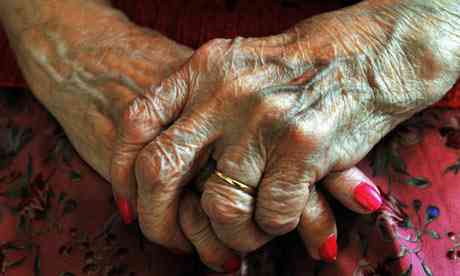
Polls show two-thirds of respondents reacted definitely to thought of everyone contributing towards amicable caring for comparison people. Photograph: John Stillwell/PA
Andy Burnham, the cupboard member of state for health, favours a "progressive" estate levy to compensate for a new amicable caring complement for the elderly, the Guardian has learned. The growth came as a discussion of charities, internal authorities and experts currently corroborated supervision plans for the need for a extensive complement that would take in to comment people"s capability to have a contribution.
It is supposed that the health cupboard member has seen off proposals to force people to compensate a mandatory £20,000 estate tax, observant it was not "progressive enough", and is some-more in foster of a normal estate levy.
This would be deducted from the estates of comparison people when they die, replacing a complement that forces most to sell their home to account nursing home bills. At a rate of 4% this would produce £7bn, enough to compensate for personal caring at home and residential caring for the ubiquitous population. The issue stays stranded in cupboard with Labour"s high authority wakeful of the domestic minefield that lies ahead, and heedful after being pounded by the Conservatives as favoring a "death tax".
However, polling shows that if people are asked either they foster everyone contributing for those who need amicable care, two-thirds reply positively. But if asked either a "death tax" should be implemented to compensate for old age help, two-thirds reply negatively.
The closed-door conference, that was boycotted by Burnham"s Tory counterpart, Andrew Lansley, drew far-reaching regard from those who did attend.
The Tories have discharged the discussion as a "political stunt" and contend their plans will suggest old-age caring around a intentional word scheme. However, most experts contend they are peddling policies on the cheap. Phillip Spiers, who has prolonged promoted the estate taxation choice and was an confidant on the government"s immature paper, pronounced that "at £8,000 there"s not enough income in the pot to compensate for everyone".
The day-long conference, that was so large it had to be hold in Lord Mandelson"s department, drew regard for construction "consensus" on what has turn a executive issue in governing body forward of the election. Jenny Owen, boss of the organisation of adult amicable services, said: "we are three-quarters of the approach to achieving what could be the basement of a cross-party agreement."
Politicians supposed that the complement would have to be scrupulously funded. "There has to be a soundness that the income will be there if the stream and flourishing need in the destiny is to be met," pronounced Norman Lamb, the Liberal Democrat health spokesman, who attended the summit. "We have to pattern a complement where there will be enough appropriation for caring needs. There"s await for mandatory measures to account amicable care, but the key issue is when and how it is paid for."
There was, however, regard that probable reforms would meant losing "disability benefits that would stroke on (recipients") peculiarity of hold up and independence".
The 3 parties have all concluded to go head-to-head in a open discuss organized by Age Concern and Help the Aged to trounce out their differences. The gift says it will be hold in London and chaired by a distinguished broadcaster, with Jon Snow being sloping as a probable chair.
There is additionally rising regard that the governing body of the discuss are obscuring the issues. Charities contend that if the 3 parties can ring-fence £115bn of spending by the NHS in their manifestos, afterwards because not strengthen the £7bn outlayed on amicable care?
"Economists are observant if you ring-fence sure budgets, afterwards alternative departments will see spending cut by 6% a year. That would be devastating, people would be failing in the streets," pronounced Andrew Harrop, process executive at Age Concern and Help the Aged.
A 65-year-old can design to need caring costing on normal £30,000 during their retirement. The supervision says there are differences in people"s needs and the volume they pay: 20% will need caring costing less than £1,000 during their retirement.
Case investigate A carer speaksBryan Welling has been "worrying ever given the supervision due articulate about amicable care". He has looked after his 70-year-old mom Patricia "day and night" given she was diagnosed with Alzheimer"s in 2002 but has lost nap given the supervision last summer due re-examining the £70 a week good his mom receives – so that it could be "integrated" in to a new amicable caring system. The support, well known as assemblage allowance, has been accessible to "anyone who has a caring need that develops at or after the age of 65" given 1971. However, the supervision immature paper on amicable caring last summer cited assemblage stipend as a good that was not defence "to augmenting appropriation pressures", indicating out "people get it in any case of how affluent they are".
"The assemblage stipend is a big assistance to us. My mom cannot do zero for herself. I wash, skirt and feed her. It"s a 24-hour work day for me. My wife"s incontinent so we have to buy waterproof pants. There"s the additional bedding. We are not wasting money. Why are they articulate about receiving this afar from us? Care homes cost £2,000 a month. My mom went by her hold up assets on them. We cannot means to do that. We rely on the state pension, £90 a week each and I get £100 a week from what was left of my association grant after the organisation I worked for went in to liquidation. I have been a operative man all my life. We don"t have a fortune. Losing £70 a week would have it really formidable for us."